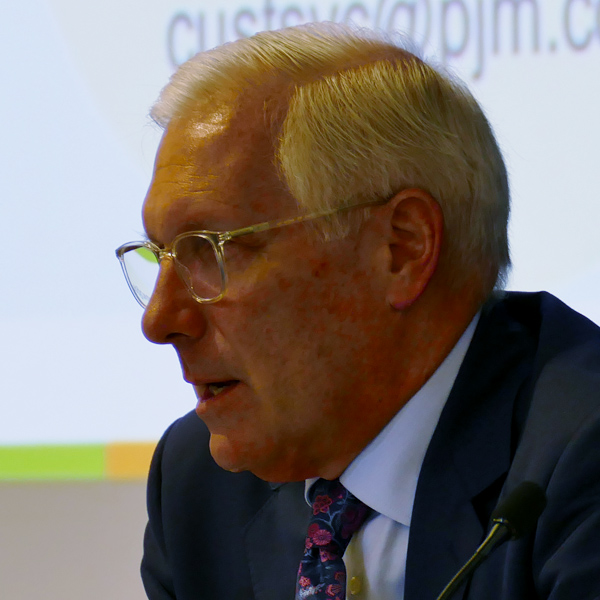
VALLEY FORGE, Pa. — PJM members will take more time to consider a proposal to require that at least one of the nine members of the RTO’s Board of Managers has “expertise in the transition to zero-carbon energy resources.”
Dave Kolata, executive director of the Illinois Citizens Utility Board (CUB), proposed the change to section 7.2 of the Operating Agreement at the Members Committee meeting Wednesday, asking that it be brought to a vote at the committee’s July meeting. Albert Pollard, a former Virginia legislator who heads CUB’s CLEAR-RTO project, said the change would allow “strategic-level peer-to-peer leadership.”
After a lengthy discussion, the sponsors agreed to withdraw their request for an immediate vote; talks are expected to continue at the next MC meeting.
Kolata and Pollard noted that many of PJM’s utilities and most of its states have clean energy commitments and that the RTO’s interconnection queue is overwhelmingly solar, wind and storage.
“As the resource mix changes, PJM’s board will need an ever deeper understanding of the risks and opportunities of balancing the spectrum of clean energy resources (nuclear, wind, solar, [distributed generation and demand response]), as well as the need for dispatch of thermal resources,” CUB’s presentation said.
Cypress Creek Renewables and Jim Davis of Dominion Energy endorsed the proposal. Brian Kauffman of Enel X North America said the proposal is a “common sense next step.”
But John Horstmann of AES said he was concerned about changing the OA without going through the Consensus Based Issue Resolution (CBIR) process, with a problem statement and issue charge. “I have a concern about this setting a precedent,” he said. “There’s things many of us would like to change in the OA.”
“I think policy questions of this narrow scope are appropriate” for this format, Pollard responded.
Constellation Energy’s Jason Barker said his company supports the idea “in concept” and that the MC was the appropriate venue to consider such a change. But he said the proposal was vague as written. “It doesn’t say how the Nominating Committee should assess” the qualifications, he said.
Paul Sotkiewicz, representing J Power USA, said he shared Hortsmann’s concern over an immediate up or down vote and would oppose the proposal. “What about a board member for DR or combined cycle gas turbines or coal or nuclear units,” he said. “Where does it stop?”
Kolata responded that his goal is ensuring reliability. “The intent is not to provide preferences for any kind of resource,” he said.
Adrien Ford, of Old Dominion Electric Cooperative, said PJM should make sure any change doesn’t delay its current search for a replacement for Manager Sarah Rogers, whom Ford said is likely to resign after the July meeting.
Kolata said the change would require FERC approval and thus wouldn’t take effect immediately.
PJM’s Dave Anders asked whether the proposal could mean “open season on rewriting the qualifications” for board members.
“We view this as discrete. We don’t view this as open season,” Kolata responded. But he acknowledged “others may make suggestions.”
MC Chair Erik Heinle, who represents D.C.’s Office of the People’s Counsel, said the committee would have further discussion on the proposal this month.
Members Debate Change to CBIR Matrix Procedure
The committee also discussed a proposal by Horstmann to revise the RTO’s rules to allow PJM staff to “seed” the blank matrix used in the CBIR matrix with potential options before stakeholders begin work on it.
Horstmann said the change to Manual 34: PJM Stakeholder Process would improve efficiency as members consider options for each design component.
Ford said the change would be helpful. “It’s hard to start from a blank sheet,” she said. She said concerns that it would give the RTO an advantage in the subsequent debates were addressed by a change allowing other stakeholders to also submit options before the first meeting at which the matrix is developed.
But Independent Market Monitor Joe Bowring expressed concern. “I don’t think it’s a good idea. I think it does give PJM a first-mover advantage” even with the revised language, he said.
The committee will be asked to approve the change at its meeting this month.

